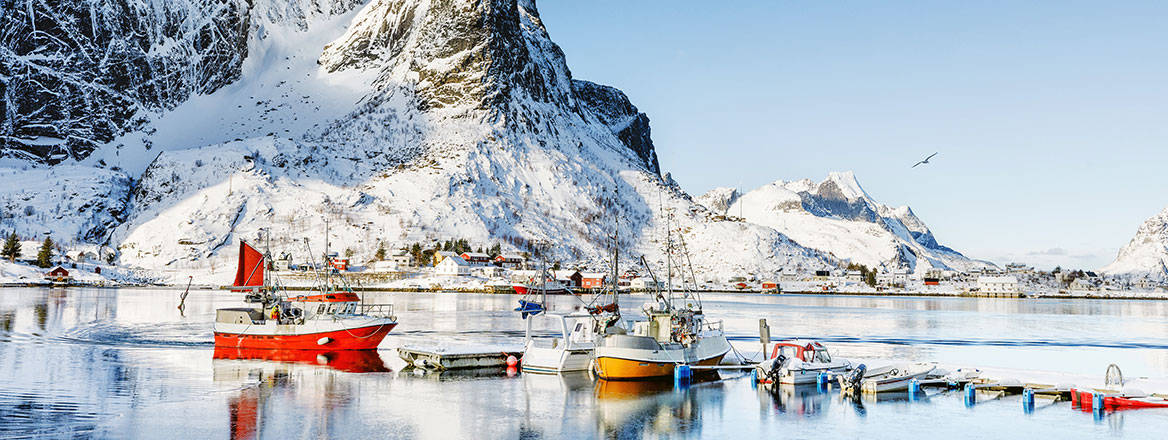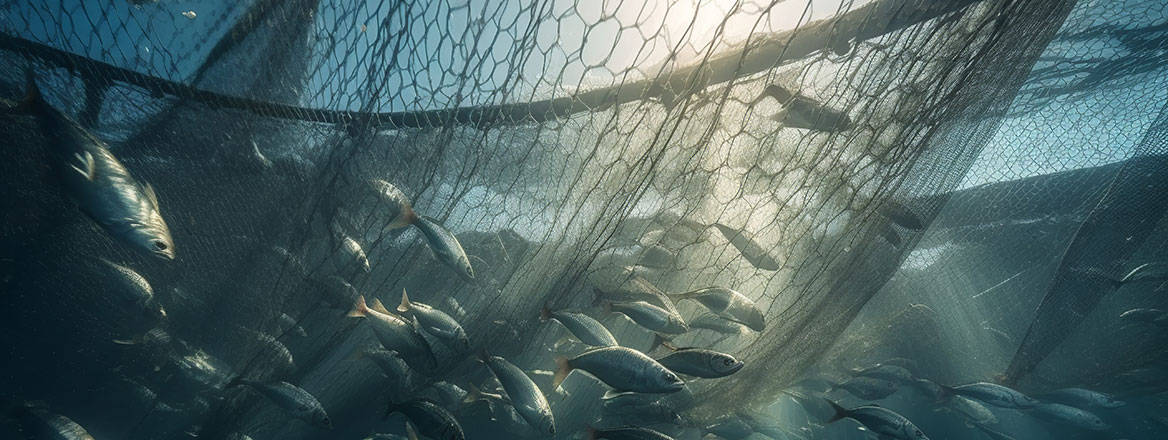In Hot Water: Arctic Fisheries as a Proxy for Geopolitical Tensions
This is the first in a three-part series on the emerging intersections between climate change and the criminal and security challenges associated with the fisheries sector, with this article focusing on the impact of a warming Arctic.
The Arctic today is playing an increasingly prevalent role in geopolitical competition between Russia, China and the West. This is particularly evident in two maritime sub-regions: the Barents Sea (North Atlantic) and the Bering Sea (North Pacific). In addition to strategic concerns associated with geopolitical competition, these Arctic maritime domains play host to a range of issues around access to maritime resources, most notably fisheries.
These issues stand to evolve significantly as climate change contributes to warming oceanic temperatures, shifting fish distributions and changing demand for fisheries products. In the Arctic, surface air temperatures are rising 2–4 times faster than the global average, with warming waters causing some of the most significant shifts in fish stocks globally, and marine catch potential in the Arctic increasing as the anticipated ranges of some species extend poleward.
All this is challenging established management regimes for transboundary resources, impacting both sustainable resource management at sea and wider security relations in the Arctic.
The North Atlantic and Barents Sea
Located north of the Norwegian and Russian mainland and adjacent to the Arctic Ocean itself, the Barents Sea is the breeding ground of the largest cod stock in the world – a critical resource for citizens of both countries. Since the 1970s, cooperation between Norway and Russia on fisheries in the Barents Sea has developed pragmatically. Often hailed as a prime example of successful co-management of shared fish stocks, this regime has withstood both the Russian annexation of Crimea in 2014 and the full-scale invasion of Ukraine in 2022.
However, tensions are mounting along two axes. First, there are fears that Russia could be utilising maritime space in the Barents Sea to challenge NATO – fears rooted in an assumption that any deliberate Russian action is likely to be hybrid in form, remaining below the threshold of direct warfare or direct conflict. Recent attention has focused on the role of Russian fishing vessels in the Barents Sea, with claims from the Norwegian naval academy that between 50 and 100 of those operating in Norwegian waters could be linked to intelligence gathering activities and pose a potential security threat. In parallel, there are mounting concerns over the vulnerability of critical infrastructure such as subsea cables (particularly in the context of climate change) and the way in which fishing vessels could be used in possible disruptive action.
If fisheries cooperation between Norway and Russia were to break down and Norway were to deny Russian fishers access to its waters, the potential for unintentional escalation could increase
Second, fears are rising around unintentional escalation in the maritime domain. The relatively high level of military exercise activity in the North Atlantic means that the danger of accidents involving fishers, both legitimate and illegal, is real. Another potential source of unintentional escalation could stem from the exercise of Norwegian maritime police authority towards Russian citizens. The Norwegian coast guard inspects and occasionally fines Russian fishers in the Norwegian exclusive economic zone (EEZ) or the Fish Protection Zone around Svalbard, with the potential for unintentional escalation should a case take on a state-state dimension.
The linkages between fisheries and security concerns here are thus apparent. These issues are likely to worsen as Arctic waters continue to warm. In this context, if fisheries cooperation between Norway and Russia were to break down and Norway were to deny Russian fishers access to its waters, the potential for unintentional escalation in the course of interaction between the coast guard and Russian fishing vessels could increase. Svalbard’s waters beyond 12 nautical miles are a particularly sensitive matter: Russia does not recognise Norway’s jurisdiction to inspect and arrest vessels in this area. By claiming that these are international waters, Russia can also claim that an inspection and potential subsequent arrest exceeds Norway’s authority in the area, and in turn respond with a threat to use military force.
The North Pacific and Bering Sea
The Bering Sea comprises the maritime area south of the Bering Strait, where the US and Russia share a maritime border. It is home to a range of marine species of significant economic value, many of which are vulnerable to climate change. US-Russian relations in the Bering Sea, however, have been difficult both historically and in recent years.
In the 1980s, the expansion of overfishing in the area prompted negotiations between the former USSR and the US on both fisheries relations and maritime boundaries. Constituting the most lucrative fisheries in North America, the pollock stock subsequently collapsed in the early 1990s after a decade of overfishing in the ‘donut hole’, a marine area not covered by an EEZ. In 2013, the two countries issued a joint statement on strengthening US-Russian cooperation in the Bering Sea. However, in recent years, tensions have become more acute with Russia’s annexation of Crimea in 2014 and subsequent invasion of Ukraine in 2022.
Although both countries have continued operating emergency services in the Bering Strait, and emergency cooperation here has continued, an increased Russian military presence and shifting stocks due to climate change have worried some US fishers. Further, Alaska’s lucrative snow crab harvest was cancelled this year for the first time ever due to stock collapse, which scientists warn will become increasingly common with climate change. As many species seek cooler, deeper waters, they are likely to migrate beyond historical boundaries, with Russia already exploiting new fishing locations within its EEZ.
Challenges emerge in the Arctic context around the unclear role of Russian fishing and research vessels, and the inherent difficulties of monitoring and control at sea
China has also increasingly expressed an interest in the Arctic – despite not sharing a border with the region – which has manifested itself through bilateral cooperation with Russia. In September 2022, reports that the US Coast Guard had spotted Chinese and Russian naval vessels engaged in some form of military operations off the coast of the Alaskan Aleutian islands offered another signal of increased Sino-Russian Arctic cooperation, in the aftermath of Russia’s 2022 invasion of Ukraine. In April 2023, a Memorandum of Understanding between the Chinese and Russian coast guards was signed in the Arctic town of Murmansk. Increased cooperation between the two countries on Arctic and ocean affairs, including fisheries, is likely to play out in the Bering Sea.
Shifting Strategic Relationships
In the near future, it is highly likely that strategic Arctic fisheries relations will become more sensitive for two reasons. First, key species – depending on their mobility and habitat connection – are expected to respond to climate change by shifting their distributions poleward to cooler waters. Indeed, in the Arctic, warming waters are causing some of the most significant shifts in fish stocks globally, with this and declining sea-ice coverage affecting fisheries and fishing patterns in key locations. Second, the Barents Sea and Bering Sea will increasingly play a role in strategic posturing, with NATO countries, Russia and even China showcasing their Arctic capabilities.
Indeed, fisheries disputes in the region are increasingly becoming entangled in wider domestic and international politics, with an impact on dynamics in the maritime domain. Rather than being a simple matter of defining rights and ownership, when a maritime dispute reaches the political agenda in this way, domestic actors may also seek to benefit by infusing it with symbolic dimensions, such as ‘national pride’ or ‘being cheated out of what is ours’. Such politicisation has become still more relevant after Russia’s 2022 invasion of Ukraine.
Challenges emerge in the Arctic context around the unclear role of Russian fishing and research vessels, and the inherent difficulties of monitoring and control at sea. Indeed, the conflict potential emanating from small-scale incidents related to both legitimate and illegal, unregulated and unreported (IUU) fisheries in the Barents Sea is greater now than it has been at any time since the end of the Cold War. Meanwhile, in the Bering Sea, increased Russian military presence, as well as military cooperation between Russia and China, will increasingly have an impact on the politicisation of fishing activities and could muster a response from the US.
As Arctic waters continue to warm, and as climate change catalyses a range of disruptive environmental shifts in the region, it will become increasingly critical to manage these relationships sensitively to ensure sustainable resource management, including the prevention of IUU fishing. This must be done in an environment in which the traditional separation between fisheries management and the high politics of security affairs, sanctions and military signalling is eroding. In this context, the security concerns and escalatory effects inherent in fisheries relations across a warming Arctic should prompt caution, calling for careful monitoring and analysis.
The views expressed in this Commentary are the authors’, and do not represent those of RUSI or any other institution.
Have an idea for a Commentary you’d like to write for us? Send a short pitch to commentaries@rusi.org and we’ll get back to you if it fits into our research interests. Full guidelines for contributors can be found here.
Related articles
WRITTEN BY
Grace Evans
Former Research Analyst
Andreas Østhagen
- Jim McLeanMedia Relations Manager+44 (0)7917 373 069JimMc@rusi.org





